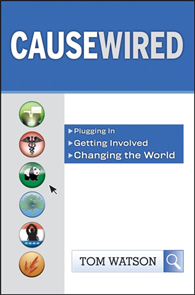This is my second post in my seven-day quest to raise $1100 to provide seven roofs for seven Guatemalan families. In these seven days, I will also be answering your questions and sharing insights gained. This post worked to answer Mezarine’s question: What do you think it would take to help the majority of nonprofits in America retain and train great fundraisers? So far, we’ve raised $295–enough for one of the roofs, and $10 away from raising roof #2. Please donate and spread the word.
UPDATE 11:22am: We’ve raised $1490, enough funds for 9 roofs. But #loveroofs supporters are challenging us to raise enough for all 14 roofs, not just seven. To make this happen, we have $710 still to raise. Do you accept the challenge?
Mezarine–To answer your question, I think non-profits need to understand the power of their network. Specifically, the untapped potential of “free agents.” Stay with me while I explain…
 Last week, Beth Kanter and Allison Fine presented at the Personal Democracy Forum about the role of the free agent. For me, my first question was: What’s a free agent? In genius style, they helped us define a “free agent” by sharing with us the story of Shawn Ahmed and his experience with the Red Cross.
Last week, Beth Kanter and Allison Fine presented at the Personal Democracy Forum about the role of the free agent. For me, my first question was: What’s a free agent? In genius style, they helped us define a “free agent” by sharing with us the story of Shawn Ahmed and his experience with the Red Cross.
Like typical Kanter and Fine posts, I find myself reflecting on this concept of a “free agent” days later. From a contract standpoint, I usually read “free agent” as an independent consultant–however, that is NOT what is meant in this discussion. Here, I see “free agent” being synonymous with the citizen philanthropist or the social citizen. It’s the empowered, empassioned individual. So, then the question becomes–who are these people?
I think customer relationship management is important here. You don’t have to use a slick and fancy CRM system (tho they can help), but mainly, you need to be detailed, diligent and deliberate.
Be Detailed: If you interact with a supporter on Twitter or Facebook or meet someone at a conference and exchange business cards, write it down. The important thing is to get in a habit of tracking your interactions with supporters and potential supporters, where they occurred, the date they occurred, what was discussed, interests, etc. and also important: be consistent in how you log this data.
Be Diligent: You need to be strategically persistent. For example, don’t reach out to a blogger or a potential sponsor with an ask being your first interaction. Get to know the people you want to work with and hope to have support your cause. Get to know your community, take the time to talk with people, know the culture, know the challenges, know the opportunities. This means that you’ll also need to adapt and be creative.
Be Deliberate: When it comes time to make an ask, be specific. Make the ask, the process, and the ability to be an ambassador of a cause fun, popular and easy. Also, make sure that whatever you’re asking, that is supports the true mission and long-term objectives of your organization. And most importantly, be deliberate in your thank you. This might seem too ‘duh’ a thought, but say more than thank you. Keep the conversation going: Ask them what worked, what didn’t, why they got involved, etc.
These are just some initial thoughts–as they say, if [fundraising] were easy, more people would be doing it. These tips might be some ways to attract and recruit supporters, but it might not enough to retain and sustain efforts. Thus, I also think nonprofits should focus on moving its network along the “Ladder of Engagement” as Beth Kanter would put it.
[Side note: It’s interesting because there’s similiar theories that all relate to moving people along a spectrum–I would LOVE to create a matrix of these on how they all relate.]
What do you think? How would you answer Mezarine’s question? And, what other questions do you have?
flickr credit: erasmuse
